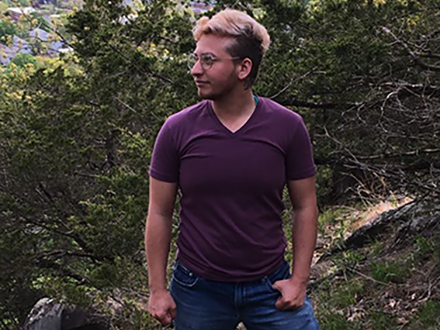By Leo Goldsmith

My path to working in climate and health was like a winding river; I was always being pulled in different directions. My variety of interests spanned several fields, and it proved difficult to decide what I wanted to be the focus of my research and career. In parallel, I was taking a similar path in figuring out my sexual orientation and gender identity. It took a lot of reflection, great mentors, and inspiring trail blazers before it became apparent that all those twists and turns were heading in the same direction.
I have since dedicated my work on the disproportionate impacts of climate change on populations who are marginalized, especially those who are sexual and gender minorities.
During my undergraduate time at Oberlin College, the science I was learning during my pre-med track was devoid of equity and social issues. Searching for more, I pursued environmental studies with an environmental justice focus. After graduating, I spent a year conducting ecological restoration and community engagement at a New York City park in Upper Manhattan. During this time, I came out as a queer, transgender man and due to limited job prospects, applied to the Yale School of the Environment. I was accepted and had opportunities to conduct tropical ecology research in Panama, consult on environmental justice indicators and mapping for the state of Connecticut, and became an Environmental Fellow under Dorceta Taylor, Ph.D.
Throughout my studies, it became clear that there was little research on how climate change impacts the health and well-being of sexual and gender minorities. One of my professors at the time, Michael Mendez, Ph.D., currently an assistant professor at University of California, Irvine, proposed a collaboration for a research paper on climate change and LGBTQ+ populations based on a final paper I wrote for his class. We co-created a workshop at the school on the subject that later was used as input on policy recommendations in the recently published paper Queer and Present Danger: Understanding the Disparate Impacts of Disasters on LGBTQ+ Communities in the Disasters journal.
Through our research and alongside Vanessa Raditz, a Ph.D. candidate at the University of Georgia, we found that LGBTQ+ communities are disproportionately impacted by disasters, such as hurricanes and wildfires. The reasons are existing socioeconomic and health inequities, lack of cultural competence in health and housing, and inequitable disaster response and emergency preparedness policies. Within the LGBTQ+ community, those at most risk include Black and indigenous individuals, older adults, incarcerated people, youth, and transgender individuals.
Currently, I am the climate and health specialist for the U.S. Global Change Research Program (USGCRP), coordinating the Interagency Crosscutting Group on Climate Change and Human Health (CCHHG). The working group coordinates, implements, evaluates, and communicates federal research and scientific activities related to the human health impacts of global climate change. We create tools for local and state health departments, and work across many themes such as food and nutrition, zoonotic and infectious diseases, extreme heat, and water-borne illnesses both domestically and abroad.
I feel very lucky to be involved and proximate to the immense amount of knowledge, passion, and hard work I am surrounded by daily. With the establishment of the Office of Climate Change and Health Equity within HHS, there will now be an even larger focus on communities that are historically marginalized within climate and health activities.
Although my work is not specifically focused on sexual and gender minorities, the activities and research that come from the working group are meant to help all who may experience health impacts from climate change. Moreover, this has been a workplace where I feel that I can be myself in every facet of who I am. I hope by doing so, I can inspire others to embrace and nurture intersectionality within themselves and their passions.

